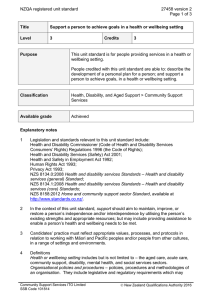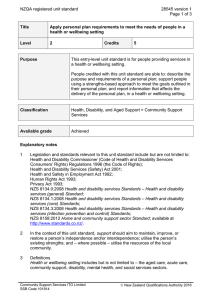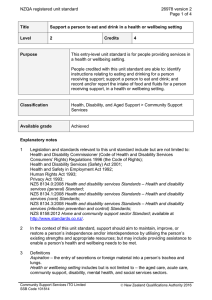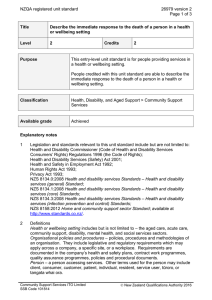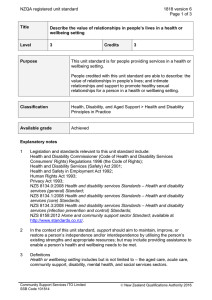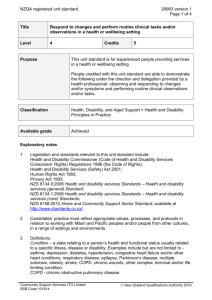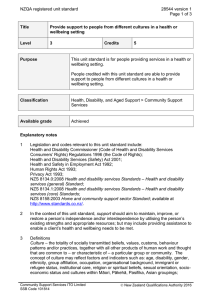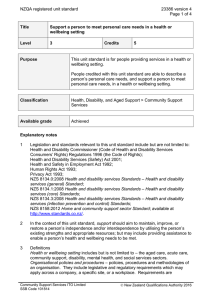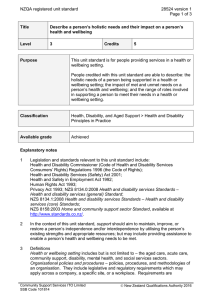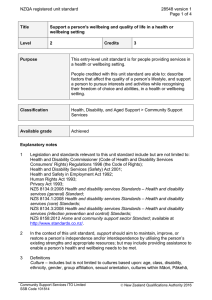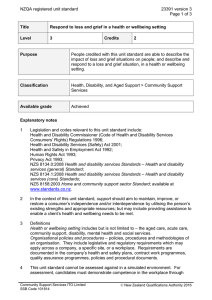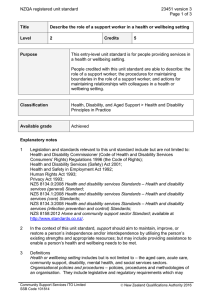26981 Describe risks, impacts, and actions for falls and
advertisement
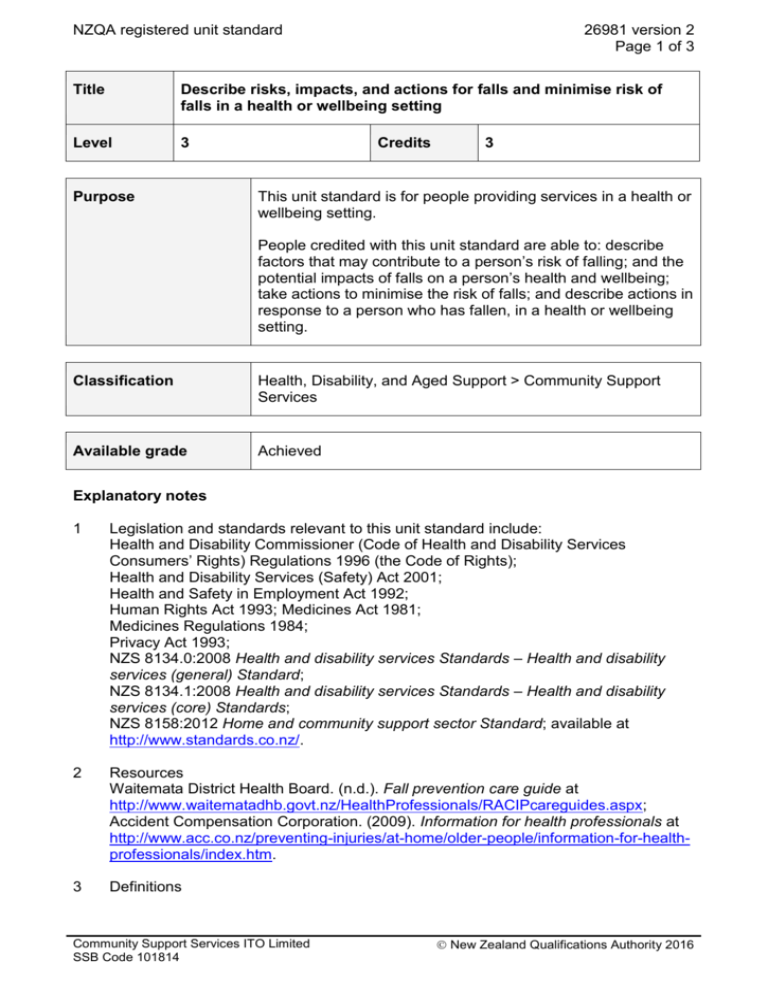
NZQA registered unit standard 26981 version 2 Page 1 of 3 Title Describe risks, impacts, and actions for falls and minimise risk of falls in a health or wellbeing setting Level 3 Purpose Credits 3 This unit standard is for people providing services in a health or wellbeing setting. People credited with this unit standard are able to: describe factors that may contribute to a person’s risk of falling; and the potential impacts of falls on a person’s health and wellbeing; take actions to minimise the risk of falls; and describe actions in response to a person who has fallen, in a health or wellbeing setting. Classification Health, Disability, and Aged Support > Community Support Services Available grade Achieved Explanatory notes 1 Legislation and standards relevant to this unit standard include: Health and Disability Commissioner (Code of Health and Disability Services Consumers’ Rights) Regulations 1996 (the Code of Rights); Health and Disability Services (Safety) Act 2001; Health and Safety in Employment Act 1992; Human Rights Act 1993; Medicines Act 1981; Medicines Regulations 1984; Privacy Act 1993; NZS 8134.0:2008 Health and disability services Standards – Health and disability services (general) Standard; NZS 8134.1:2008 Health and disability services Standards – Health and disability services (core) Standards; NZS 8158:2012 Home and community support sector Standard; available at http://www.standards.co.nz/. 2 Resources Waitemata District Health Board. (n.d.). Fall prevention care guide at http://www.waitematadhb.govt.nz/HealthProfessionals/RACIPcareguides.aspx; Accident Compensation Corporation. (2009). Information for health professionals at http://www.acc.co.nz/preventing-injuries/at-home/older-people/information-for-healthprofessionals/index.htm. 3 Definitions Community Support Services ITO Limited SSB Code 101814 New Zealand Qualifications Authority 2016 NZQA registered unit standard 26981 version 2 Page 2 of 3 Health or wellbeing setting includes but is not limited to – the aged care, acute care, community support, disability, mental health, and social services sectors. Organisational policies and procedures – policies, procedures and methodologies of an organisation. They include legislative and regulatory requirements which may apply across a company, a specific site, or a workplace. Requirements are documented in the company’s health and safety plans, contract work programmes, quality assurance programmes, policies and procedural documents. Person – a person accessing services. Other terms used for the person may include client, consumer, customer, patient, individual, resident, service user, tūroro or tangata whai ora. Outcomes and evidence requirements Outcome 1 Describe factors that may contribute to a person's risk of falling in a health or wellbeing setting. Evidence requirements 1.1 Factors that may contribute to a person’s risk of falling are described in terms of environmental, physical, psychological or medication factors. Range evidence is required of three examples for each of three factors. Outcome 2 Describe the potential impacts of falls on a person's health and wellbeing. Evidence requirements 2.1 The potential physical impacts of falls are described in terms of the health and wellbeing of the person who has fallen. Range 2.2 evidence is required of three potential physical impacts. The potential social impacts of falls are described in terms of the health and wellbeing of the person who has fallen. Range evidence is required of three potential social impacts. Outcome 3 Take actions to minimise the risk of falls in a health or wellbeing setting. Evidence requirements 3.1 Actions to minimise the risk of falls are taken in accordance with organisational policies and procedures. Range evidence is required of four actions. Community Support Services ITO Limited SSB Code 101814 New Zealand Qualifications Authority 2016 NZQA registered unit standard 26981 version 2 Page 3 of 3 Outcome 4 Describe actions in response to a person who has fallen in a health or wellbeing setting. Evidence requirements 4.1 Actions in response to a person who has fallen are described in terms of organisational policies and procedures. 4.2 Falls reporting and recording requirements are described in terms of organisational policies and procedures. Planned review date 31 December 2019 Status information and last date for assessment for superseded versions Process Version Date Last Date for Assessment Registration 1 21 January 2011 31 December 2017 Review 2 16 April 2015 N/A Consent and Moderation Requirements (CMR) reference 0024 This CMR can be accessed at http://www.nzqa.govt.nz/framework/search/index.do. Please note Providers must be granted consent to assess against standards (accredited) by NZQA, before they can report credits from assessment against unit standards or deliver courses of study leading to that assessment. Industry Training Organisations must be granted consent to assess against standards by NZQA before they can register credits from assessment against unit standards. Providers and Industry Training Organisations, which have been granted consent and which are assessing against unit standards must engage with the moderation system that applies to those standards. Requirements for consent to assess and an outline of the moderation system that applies to this standard are outlined in the Consent and Moderation Requirements (CMRs). The CMR also includes useful information about special requirements for organisations wishing to develop education and training programmes, such as minimum qualifications for tutors and assessors, and special resource requirements. Comments on this unit standard Please contact the Community Support Services ITO Limited enquiries@careerforce.org.nz if you wish to suggest changes to the content of this unit standard. Community Support Services ITO Limited SSB Code 101814 New Zealand Qualifications Authority 2016
